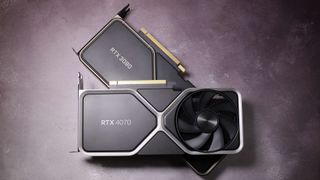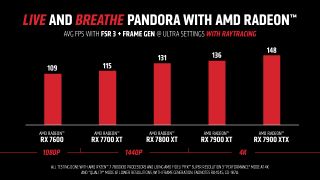The new Avatar game has a graphics preset so 'extremely difficult to run' you're probably Na'vi gonna turn it on
Hold on to your Toruk, the so-called unobtanium graphics setting is intended to melt future hardware.

I don't remember much from the hit 2009 movie Avatar, but I do remember that the main reason they even bothered to create big blue boy suits to explore the moon of Pandora was to collect a rare mineral known as unobtanium. And you bet unobtanium is making a comeback for the new game set in the Avatar universe, Avatar: Frontiers of Pandora, but not entirely in the way you might expect.
I'm sure there's plenty of references to unobtanium in the Avatar game's story, but this super rare mineral key to Earth's continued existence (I'm googling the story as I go) also shows up in the game's settings menu. It's the nickname given to the graphics quality mode that is so demanding to run on current hardware you probably shouldn't even bother trying, or so say Ubisoft studio Massive Entertainment.
"Unlock the additional 'Unobtanium' preset that exceeds the 'Ultra' preset," the Avatar: Frontiers of Pandora PC deep-dive posts says.
"This preset is extremely difficult to run on currently available hardware and is meant to really stress future hardware to keep the Avatar: Frontiers of Pandora PC Benchmark relevant for years to come."
Ubisoft has been teasing Avatar's impressive tech specs thanks to "major upgrades" to the Snowdrop Engine behind the game. Mostly focusing on ramping up the level of detail throughout the world, through the microdetail system, Avatar also includes heaps of ray-traced effects that will likely kick some graphics cards to the curb.
Though the big question will be whether the pay-off is worth it for the performance drop. Besting the mightiest gaming graphics card on the planet today, the RTX 4090, with graphics is great—providing it's because the game actually looks good, and isn't just a resource hog for no reason. A CPU limited game is somewhat less exciting to me, I must admit.
Our reviewer Noah Smith has cited a few technical hiccups in their Avatar: Frontiers of Pandora review in progress, though they were hoping some of these would be mitigated by proper day-1 drivers.
The biggest gaming news, reviews and hardware deals
Keep up to date with the most important stories and the best deals, as picked by the PC Gamer team.


Best CPU for gaming: The top chips from Intel and AMD.
Best gaming motherboard: The right boards.
Best graphics card: Your perfect pixel-pusher awaits.
Best SSD for gaming: Get into the game ahead of the rest.
It's worth mentioning that DLSS 3.5 and FSR 3 upscaling are both included in the game to help bump those frames up, whether you're striving for unobta(i)nable graphics or no.
Frame generation is also included in the game—the hot new performance technology on the scene—though is AMD's own implementation, rather than Nvidia's which we've recently seen come to the rescue in Alan Wake 2. Ubisoft only recommends frame gen be used if the game already exceeds 60 fps, but claims it will often deliver double performance. A sweet bonus providing the game runs decently well without any upscaling.
But here's hoping this unobtanium graphics setting really is the current-gen killer Ubisoft says it is. It'd be good to have another GPU-melting game to benchmark alongside the path-traced versions of Cyberpunk 2077 and Alan Wake 2—especially as both of those games are built with Nvidia hardware in mind and Avatar appears way more AMD-friendly.
AMD has released some figures for the sort of frame rates we can expect on its own gear.

AMD says it has worked with Ubisoft for years on the Snowdrop engine, tweaking it to work a treat on its own hardware. That might mean this game actually favours an RX 7900 XTX for top performance, though clearly even that card is still not powerful enough to be considered unobtanium-ready.

Jacob earned his first byline writing for his own tech blog. From there, he graduated to professionally breaking things as hardware writer at PCGamesN, and would go on to run the team as hardware editor. He joined PC Gamer's top staff as senior hardware editor before becoming managing editor of the hardware team, and you'll now find him reporting on the latest developments in the technology and gaming industries and testing the newest PC components.
Most Popular







